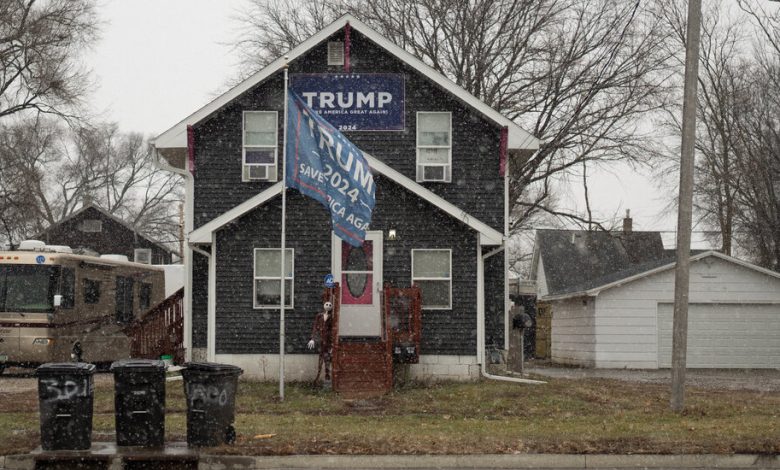The Big Questions Looming Over the Iowa Caucuses: Here’s What to Expect

It may feel as if there is little suspense over who is likely to win the Republican presidential caucuses in Iowa on Monday.
But in Iowa, the unexpected can be the expected and a win is not always a win. The result could shape the future of the Republican Party at a time of transition, and the future of the Iowa caucuses after a difficult decade. It could help determine whether Nikki Haley, the former U.S. ambassador, presents a serious obstacle to Donald J. Trump’s return to power — or whether Ron DeSantis, the governor of Florida, will be forced out of the race.
Here’s a guide to some possible outcomes and what they mean for the contenders:
A Trump victory
All the assumptions about a big Trump night mean that the former president’s biggest opponent may turn out to be expectations — and not his two main rivals on the ballot, Ms. Haley and Mr. DeSantis. Mr. Trump and his campaign have set the bar high. Mr. Trump has run as an incumbent, not even debating his opponents. His aides say they think he can set a record for an open race by finishing at least 12 points ahead of his nearest rival.
And for Mr. Trump, that could be a problem.
“Trump has been polling around 50 percent plus or minus,” said Dennis J. Goldford, a political science professor at Drake University in Des Moines. “If he were to come in at 40, that’s a flashing yellow light. That suggests weaknesses and uncertainty.”
Two forces could complicate Mr. Trump’s hopes for the night. Those same polls that show him heading for victory, the polls he boasts about at almost every rally he does in Iowa, could feed complacency among his supporters. Why come out and caucus — Caucus Day temperatures are projected to reach a high of zero degrees in places — if Mr. Trump is going to win anyway?
And unlike Democrats’ caucuses, this is a secret ballot; Republicans do not have to stand and divulge their vote to their neighbors. That could matter if there really is a hidden anti-Trump sentiment out there that Mr. DeSantis and Ms. Haley have been banking on.
Of course, these are just what-ifs. Mr. Trump has appeared to take a lesson from 2016, when, after leading in the polls, he lost the caucus to Senator Ted Cruz of Texas. This time, he has deployed an immense field organization and traveled across Iowa, urging his supporters to vote. “He’s coming back to the state again and again,” said Jeff Angelo, a former Republican state senator who now hosts a conservative talk show on WHO-AM. “They are not going to take it for granted this time.”
A weak showing by Mr. DeSantis
The governor of Florida was once seen as Mr. Trump’s biggest threat and Iowa was the state where he could seize the mantle of being the Trump alternative. But Mr. DeSantis has not lived up to his billing, and the rise of Ms. Haley has forced him to the edge of the stage.
The test for Mr. DeSantis, earlier this campaign season, was whether he could use Iowa to create a two-way race with Mr. Trump. Now, he is struggling to make certain that he at least scores what he was always expected to score: a strong second-place finish.
Mr. DeSantis’s supporters say they remain confident he will come in second — and perhaps even upset Mr. Trump. “If you believe in polls, hopefully he comes in a solid second,” said Bob Vander Plaats, an influential evangelical leader in Iowa who has endorsed Mr. DeSantis. “If you believe the ground game, there’s a potential he could upend the former president in Iowa. He has by far the best on-the-ground operation I’ve seen.”
“A lot of people are waiting to write DeSantis’s obituary,” he said. “I just see DeSantis having a good night on caucus night.”
Coming in second place could propel the DeSantis campaign on to New Hampshire. But a weak second-place showing — if he just barely edges out Ms. Haley, or the results are still in dispute air as he leaves Iowa — could confirm Republican concerns about his political appeal, and force him to drop out. And coming in third?
“Look, he told all of us that he’s all in for Iowa,” said Mr. Angelo. “You finish third in Iowa, I don’t see how you continue.”
But even with a second-place showing — which his campaign would call a win — it’s hard to see how Mr. DeSantis builds on that. He trails the field in most public and private polls in New Hampshire. In fact, Mr. DeSantis is not competitive in any of the upcoming states. In a recent interview on NBC News, he declined to list any other states where he could win. He is not putting much effort, in terms of spending or ground game, in any other state. His best hope, it would seem, is that Mr. Vander Plaats is correct and he somehow pulls off an upset victory over Mr. Trump.
A strong showing by Ms. Haley
If Ms. Haley does come in a solid second, this becomes a different race. She would head into New Hampshire, a state where she has strong institutional support, with the wind at her back, even after a few weeks that have been marked by stumbles on the campaign trail. She could present herself as a real alternative for Republicans looking for another candidate besides Mr. Trump to lead the party this November.
And her supporters would almost certainly turn up the pressure on Mr. DeSantis to step aside to allow the party to unify around her. “That becomes the story of the caucus,” said Jimmy Centers, a longtime Iowa Republican consultant. “She becomes the alternative to former President Trump. And then I think the chorus is going to say, it’s time for the field to winnow so they can go head-to-head.”
If Ms. Haley finishes in third place, Mr. DeSantis will presumably try to push her out of the race. But why should she leave? She will only be moving on to politically friendlier territory, as the campaign moves first to New Hampshire then to her home state, South Carolina.
If Mr. DeSantis and Ms. Haley continue their brawling into New Hampshire, Mr. Trump will be the beneficiary. “If you don’t have a clear second-place person who can claim the mantle of where the ‘not-Trump’ vote goes in subsequent states, I don’t see where Trump is facing any challenges going forward,” said Gentry Collins, a longtime Iowa Republican leader.
Another rough night for Iowa?
This has been a tough decade for the Iowa caucuses. In 2012, Mitt Romney, the governor of Massachusetts, was declared the winner of the Republican caucus, but 16 days later, the state Republican Party, struggling to count missing votes, said that Rick Santorum, the former senator from Pennsylvania, had actually finished first.
The 2020 Democratic caucus turned into a debacle, riddled with miscounts and glitches, and the brigade of reporters who had descended on Iowa left before the final results were known. (Quick quiz: Who won the 2020 Iowa Democratic caucus?)
When there is already so much distrust of the voting system, fanned by Mr. Trump, the last thing Iowa needs is another messy caucus count. That would arguably be bad for Iowa, but also for the nation.
“What I’m concerned about is that you could have a repeat of 2012,” said David Yepsen, the former chief political correspondent for The Des Moines Register who in 2020 predicted that the meltdown — which robbed Pete Buttigieg of momentum from his narrow victory — would spell the end for Iowa’s Democratic caucus.
“You have 180,000 people voting in a couple of thousand precincts on little slips of paper that are hand-tabulated,” he said. “The doomsday scenario is that they have problems with their tabulations. With all this talk about voting being rigged, I just think the country is going to feel jerked around if Iowa Republicans don’t get this right.”




